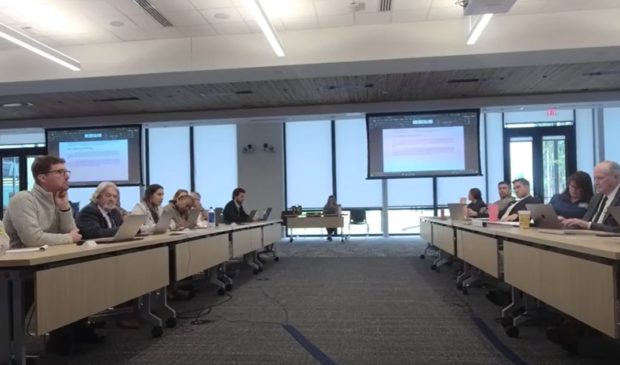Community advocates seek to expand police oversight – but not at the bargaining table
Thursday, November 3, 2022 by
Emma Freer After months of negotiation over a new police labor contract, the city and the police union have reached an impasse over the most contentious issues: civilian oversight and pay.
As the bargaining teams attempt to forge a path forward, balancing the city’s finite budget and desire for increased oversight with the union’s demand for higher wages amid inflation and long-standing staffing shortages, community advocates for criminal justice reform are trying to overhaul the process altogether.
“We ultimately have sat in too many of these meetings and seen this process play out too many times,” Chris Harris, policy director of the Austin Justice Coalition and president of Equity Action, told the Austin Monitor. “We have an understanding and a belief that we can’t reach a strong, stable system of oversight that is negotiated every few years with the police association.”
The city’s bargaining team has cited community demand for increased transparency and accountability when pushing for increased oversight. But Harris said the city’s proposals have been watered down too much in pursuit of an agreement, despite APA’s continued opposition.
For instance, the city currently advocates for removing the Office of Police Oversight from the contract and extending its authority so its representatives could participate fully in internal investigations of alleged police misconduct.
Harris noted, however, that the city previously proposed removing both OPO and the Community Police Review Commission from the contract back in March. He also worried that the latest proposal limits OPO to investigating only those complaints APD chooses to pursue.
Harris raised other concerns about the negotiation process.
After City Council unanimously rejected a police contract in 2017, leading to a new agreement in 2018 that strengthened oversight, he was optimistic that the negotiation process could achieve meaningful civilian oversight. But this feeling was short-lived.
In 2020, the Austin Police Association filed a grievance alleging that OPO had violated the contract by investigating complaints against police officers. The following year, an arbitrator found OPO “had illegally investigated complaints against police officers” and “ordered (the office) to stop doing so,” as The Austin Chronicle reported in January.
Against this backdrop, Equity Action, a local political action committee, successfully spearheaded a petition initiative earlier this year in an effort to remake civilian oversight of the Austin Police Department.
In May, Austin voters will decide whether to pass the Austin Police Oversight Act, which would remove civilian oversight of the police department from future contracts. It also would grant the Office of Police Oversight and Community Police Review Commission access to any police records they require, including confidential personnel files, and allow the office to recommend disciplinary action in cases of police misconduct.
“Much of the conceit of pursuing an ordinance is to take as much of that … out of the negotiation process,” Harris said. “To set it up in a way that it cannot be negotiated or grieved away.”
The current contract expires in March, and both bargaining teams have reiterated their desire to reach a new agreement to avoid falling out of contract. Lowell Denton, an outside attorney for the city, also told APA that City Manager Spencer Cronk “would very much like for us to do our best to put this contract together and to reach an agreement as quickly as possible, if that’s feasible,” during an Oct. 19 bargaining session.
Despite this urgency, Harris hopes City Council will wait to approve a new four-year contract until after the May election.
“We understand that a new long-term contract will thwart the will of the voters on this issue for years,” he said. “Unless a long-term contract is put in front of the Council that overwhelmingly mirrors the ballot measure, the Council shouldn’t vote for it.”
In the meantime, the city and the police union return to the bargaining table on Nov. 10.
Update: “The City Manager has made it clear that keeping our community safe is a top priority. The high vacancy rate at APD must be addressed and reaching an Agreement with APA is one of the key strategies to recruit and retain a qualified police force to keep our community safe,” said a city of Austin spokesperson to the Austin Monitor. “As we saw in 2017, falling out of contract with the Austin Police Association (APA) is detrimental both to recruitment and retention of our officers, and in providing the appropriate level of police oversight that reflects the overarching values and goals of our community. The Manager has directed the City’s labor negotiating team to work steadfastly toward reaching a contract with APA and has also asked for a draft Ordinance related to the Office of Police Oversight that the City Council can consider.”
The Austin Monitor’s work is made possible by donations from the community. Though our reporting covers donors from time to time, we are careful to keep business and editorial efforts separate while maintaining transparency. A complete list of donors is available here, and our code of ethics is explained here.
You're a community leader
And we’re honored you look to us for serious, in-depth news. You know a strong community needs local and dedicated watchdog reporting. We’re here for you and that won’t change. Now will you take the powerful next step and support our nonprofit news organization?






